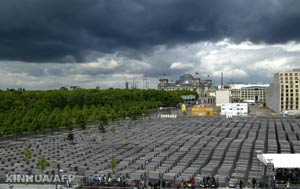
A general view of the Holocaust memorial site in Berlin.
The vast memorial consists of 2,711 dark gray concrete pillars, which together
produce an impression of an open grave yard.
Germany unveiled a national Holocaust memorial in central Berlin Tuesday,
commemorating the six million European Jews slaughtered by the Nazi regime.
The memorial, located hundreds meters away from the landmark Brandenburg Gate
in the city center and covering 19,000 square meters, opened two days after the
60th anniversary of the end of World War II in Europe.
Wolfgang Thierse, speaker of the German Parliament, joined Chancellor Gerhard
Schroeder and President Horst Koehler at the opening ceremony.
Thierse took the opening of the memorial as a conscious confession of Germany
to "the biggest crimes in its history."
"Today we open a monument that recalls the worst, the most dreadful crimes by
Nazi Germany -- the attempt to destroy an entire people," he told a thousand
guests from around the world, including Nazi Holocaust survivors.
Thierse stressed that it will not represent "a definite closurein the
handling of our Nazi history."
While speaking out his recognition and appreciation, the head of Germany's
Central Council of Jews, Paul Spiegel, expressed his reserved opinion over the
monument at the opening ceremony.
The memorial failed to let visitors "be confronted with the question of guilt
and responsibility," he said.
"The memorial for the murdered Jews of Europe honors the victims of Nazism,
but it does not refer directly to the perpetrators," Spiegel said.
Nevertheless, Spiegel said the memorial was "an important and necessary sign"
in remembrance of the Holocaust victims.
The vast memorial, designed by US architect Peter Eisenman, consists of 2,711
dark gray concrete pillars, which together produce an impression of an open
grave yard.
An underground information center complements the field of pillars with
stories of Holocaust victims.
Some people have argued that the design was too abstract. Others have
criticized it for honoring the Jews and not other victims of Nazi regime.
The German Parliament voted to earmark some 27.6 million euros (35.5 million
US dollars) to the project in 1999 and the construction work began two years
later.



